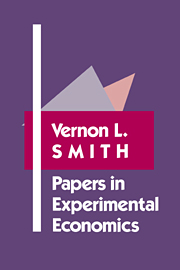Book contents
- Frontmatter
- Contents
- Preface
- Acknowledgments
- Part I The Formative Years
- Part II Institutions and Market Performance
- Part III Public Goods
- Part IV Auctions and Institutional Design
- PART V Industrial Organization
- Introduction
- 32 An Empirical Study of Decentralized Institutions of Monopoly Restraint
- 33 Natural Monopoly and Contested Markets: Some Experimental Results
- 34 In Search of Predatory Pricing
- Part VI Perspectives on Economics
Introduction
Published online by Cambridge University Press: 06 July 2010
- Frontmatter
- Contents
- Preface
- Acknowledgments
- Part I The Formative Years
- Part II Institutions and Market Performance
- Part III Public Goods
- Part IV Auctions and Institutional Design
- PART V Industrial Organization
- Introduction
- 32 An Empirical Study of Decentralized Institutions of Monopoly Restraint
- 33 Natural Monopoly and Contested Markets: Some Experimental Results
- 34 In Search of Predatory Pricing
- Part VI Perspectives on Economics
Summary
Vickrey's contributions to bidding and auctioning theory and to incentive compatibility in his influential 1961 paper have tended to overshadow and to obscure somewhat the general motivating research question in that paper: Where markets are imperfectly competitive can a state agency, through “counterspeculation,” create the conditions whereby efficient resource allocation is maintained? Vickrey acknowledges that it was A. P. Lerner who originally posed the question. Today we might rephrase the question in the form: Can one find property-right institutions with the characteristic that market efficiency will be achieved in a wide variety of environments without the state having to engage in discretionary interventionist policies, or – as Hayek would put it – so that people would be guided to take the right actions without a central authority having to tell them what to do?
This is of course precisely the problem of institutional design – an art form in which Vickrey is surely the leading past master. I didn't read Vickrey's paper until around 1975, after I had completed most of my Groves-Ledyard public good experiments. That event spawned the experimental research program in auctions with my honors undergraduate students, Vicki Coppinger and John Titus, and also the experiments that culminated in the first paper (number 32) reprinted in this section.
- Type
- Chapter
- Information
- Papers in Experimental Economics , pp. 705 - 706Publisher: Cambridge University PressPrint publication year: 1991



